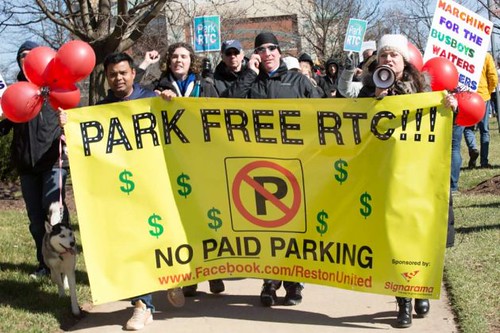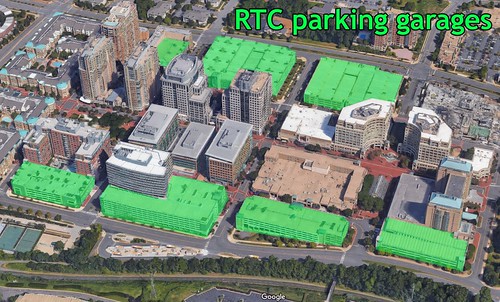Boston Properties backs down in Reston
I wrote about the issue of Boston Properties, the large developer which owns Reston Town Center, implementing charging for parking. They argued that people using the Metrorail after the Silver Line opened were "parking for free all day, using up the spaces," and the necessary response was charging for parking.
I made the point that even though the development is privately owned, people think of it as a "town center" with public space aspects, and therefore Boston Properties needed to employ "public planning processes" to best address the matter ("Reston Town Center parking issue as a "planning failure" by the private sector").
They didn't, and poorly implemented their parking program besides, making a bad situation worse.
The Washington Business Journal reports ("Boston Properties budges on paid parking at Reston Town Center") that Boston Properties announced they won't be charging for parking at night- and on weekends--reversing the current practice--and that the first hour of parking during the week will be free.
Wouldn't it have been a lot easier to have worked all this out through a very robust public planning process?

Photo by Don Renner. Also see "Organizers say Town Center parking protest was a 'huge success,'" Reston Now.
That would have created goodwill instead of badwill, and they would have gotten clearer signals that regardless of their long term desire to make money off parking, the competitive situation and people's expectations are such that they can only institute paid parking where there is a clear need for that form of market signal to shape desired outcomes.
Dan Malouff of BeyondDC produced a photo illustration to demonstrate how much parking there is available at Reston Town Center.

Labels: car culture and automobility, civic engagement, land use planning, parking and curbspace management, suburban revitalization, sustainable mobility platform, transportation planning, urban design/placemaking



6 Comments:
the metro stop is not at all close to RTC which makes it just as hard as before to access. This whole area is a huge disgusting car ghetto and this despite some nice features of RTC itself you could not pay me enough to live in a $hit hole like the Northern Virginian suburbs mostly are. EVERYTHING out there requires car access and car mobility and its about time that the District won back some of our historic retail and population from that miserable ugly and unplanned morass of suburban sprawl
The next stop on the extension will be closer.
But yes, it's sub-urbanism, but it's more urban than a lot of places.
For DC to "win back population and retail" it's going to have to agree to more housing.
As it is, it can't win back "all" the historic retail because the field is so deconcentrated and most suburbanites have little interest in traveling into DC to shop.
But we can get more.
E.g., from the Walmart on NJ Ave. NW along H Street NE to the Aldi on 16th St. NE and up to Union Market there are/will be 6 grocery stores plus a food market district.
To be able to get to that many grocery stores in such a short distance beats the suburbs.
If the issue was actually a real problem, people were probably parking @RTC then busing to Wiehle. The RTC station will be close. Reston is not difficult to live in without a car, I've known people to do it, and like anyplace it all depends where you live and work. As far as "win back population and retail" (eyeroll) the big impediment besides housing cost is education, both secondary and beyond. New immigrants and domestic migrants, at least those with kids and looking to "settle" know FCPS is a quality system. Beyond that, there is the VA system of public universities. I came close to settling in the district at one point in my life, but opted not to because I knew more education would be in my future. UDC and out-of-state tuition at other institutions wasn't desirable.
prior to the 68 EVERYTHING in this area was in the city. If you needed steel for making buildings, if you needed plumbing parts, shopping, toys, liquor, cigarettes, cars, bicycles. .after this -in a period amounting to only a few years we got home rule-which was really permission from the federal government for the local authorities to tax the HELL out of anything that walked or walks in DC so the businesses-fearing crime and high taxes- all left the city. I personally REMEMBER when DC was this way-before the riots-when there were multiple department stores along F street and everyone came to DC to shop. We have been bankrupted by the elite that control the city-as well as frustrated and impoverished people w/o recourse who had to lash out and destroy and vandalize even the very people and properties of those willing to assist...
It wasn't just the riots. Suburban development was happening before the riots, stores began moving out of the city, shopping malls and centers were being developed. It accelerated after the riots, and probably wouldn't have been so pronounced if the riots hadn't happened, etc.
It's like with Detroit. I remember this period, and the 1967 riots (but I was a child, so I really remember the year after more). Detroit was experiencing outmigration, store development in the suburbs, etc., we just didn't realize it was on the cusp of failure, didn't really notice the various automobile manufacturing plants leaving the city, etc.
ANON@1:26:
Very good point about universities (and schools). In fact, I complained to Delegate Norton that her college assistance program should also include graduate school. No response though.
The thing about immigrants, besides the relative high cost of housing even when the city wasn't doing so great, is that succeeding generations of immigrants go where there is already the cluster, hence Asians moving further out into Fairfax County (from Clarendon), Hispanics moving to Langley Park and Arlington, etc.
It's kind of like people hopped to the suburbs, and then later generations skip to them directly.
In many places, but not so much DC proper, immigrants are a great way to absorb other unused space in weak markets. But in a relative sense, DC was either too expensive or too unsafe for it to be a primary destination.
Post a Comment
<< Home